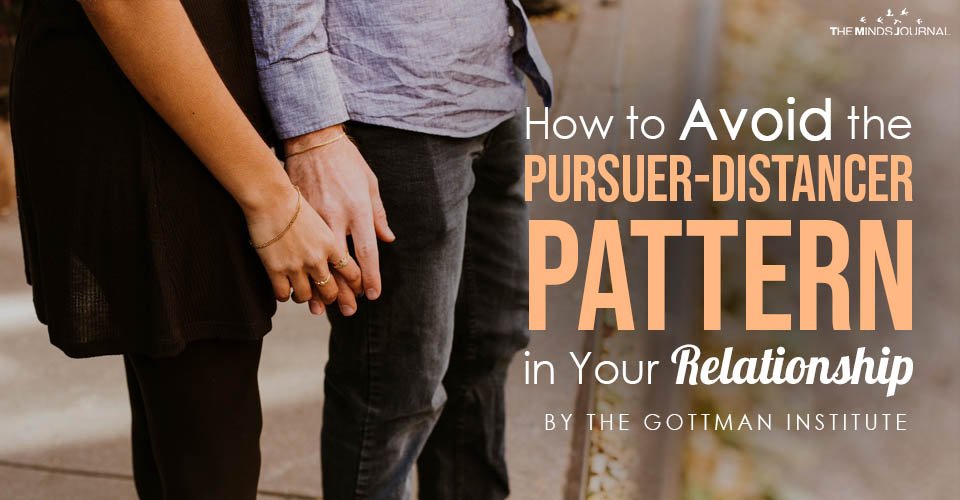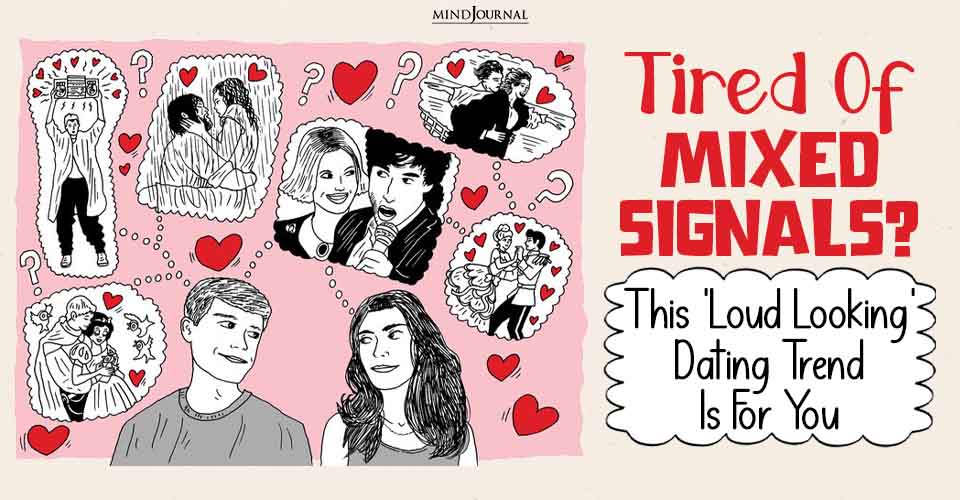By Steve Horsmon
Is it really difficult to ignore Pursuer- Distancer pattern in relationships?
Jane: “Why do you do that?”
John: “Do what?”
Jane: “You ignore me.”
John: “No, I don’t.”
Jane: “We need to talk about this. You’re doing it now.”
John: “I don’t see the problem. You’re overreacting.”
Jane: “No, I’m not!”
John: “I don’t want to talk about this anymore.”
Jane is pursuing. John is distancing.
In her study of 1,400 divorced individuals over 30 years, E. Mavis Hetherington found that couples who were stuck in this mode were at the highest risk for divorce.
Researcher Dr. John Gottman also noted that this destructive pattern is an extremely common cause of divorce. He claims that if left unresolved, the pursuer-distancer pattern will continue into a second marriage and subsequent intimate relationships.
The pursuer-distancer pattern
Therapist Dr. Harriet Lerner summarizes the pattern like this.
A partner with pursuing behavior tends to respond to relationship stress by moving toward the other. They seek communication, discussion, togetherness, and expression.
They are urgent in their efforts to fix what they think is wrong. They are anxious about the distance their partner has created and take it personally.
They criticize their partner for being emotionally unavailable. They believe they have superior values. If they fail to connect, they will collapse into a cold, detached state. They are labeled needy, demanding, and nagging.
A partner with distancing behavior tends to respond to relationship stress by moving away from the other. They want physical and emotional distance. They have difficulty with vulnerability.
They respond to their anxiety by retreating into other activities to distract themselves. They see themselves as private and self-reliant.
They are most approachable when they don’t feel pressured, pushed, or pursued. They are labeled unavailable, withholding, and shut down.
Dr. Lerner points out the importance of recognizing that neither pattern is wrong. In a normal relationship, we may actually take turns adopting one role or the other.
Healthy relationships can handle the stress with mutual respect and appreciation because both partners are aware of their behavior and are willing to adjust it for the benefit of the relationship.
Marriages fall apart when partners become entrenched in the roles. If something does not change, both begin to feel criticized and develop contempt for each other – two signs their marriage is doomed to fail, according to Dr. Gottman.
What does it look like?
A common scenario is a wife who is very anxious about the lack of communication from her husband. She wants him to open up to her more.
She wants him to be more vulnerable and to connect with her so they can work on getting along better. His response is, “I don’t know what you’re talking about.”
She makes demands, he moves away. Her frustration shows as she begins to criticize him and he fights back with defensiveness. She becomes angry and expresses contempt. He stonewalls.
She doesn’t understand why he won’t see how wrong and stubborn he is.
He can’t believe she doesn’t know how unfair her demands make him feel.
He’s not good enough for her.
Both men and women can be pretty good pursuers. I think this skill is best used for pursuing mutual happiness rather than our own righteousness.
Why does it matter?
The research by Gottman and Hetherington is important. It can save an individual from a life of bad relationships.
The research sheds light on the extremely common dynamics that happen in everyday relationships with everyday people.
It gives language and insight to the thoughts, emotions, and behaviors which consistently cause the erosion of relationships. What matters is what you choose to do with the insights from the research.
With proper information and willingness, you can choose how you will respond to the pursuer-distancer pattern when it happens in your relationship.
Pursuers must stop pursuing
Dr. Lerner notes something I see consistently with clients who are pursuers.
The pursuer is the one in more distress about the distance, and more motivated to change the pattern. For this reason, the pursuer is often best served by discovering ways to call off the pursuit—and there are ways to reconnect with a distancing partner that don’t involve aggressive pursuing.
A distancer may feel unhappy about how things are going in a relationship, but he or she is still more likely to maintain the status quo than to move toward a partner who is in pursuit mode. This is the reality faced by the pursuer men I work with.
His distancer partner’s ability to maintain the status quo is confusing for him. She will stay in distancer mode for years while he keeps trying the same pursuer tactics.
She feels powerless to turn toward him because she needs to feel a decrease of the intense pressure of his relentless pursuit.
The impact on a woman’s ability to trust from years of pursuit can be enormous. It’s hard for him to understand her fear about reconnecting.
Rebuilding trust requires a consistent and dependable energy of acceptance and respect. She wants to feel less pressure, less judgment, and less anger.
When he chooses to understand and empathize with these critical needs, he can choose a new mindset: He can love her in ways that pull her toward him instead of pushing her away. He can choose to understand before providing advice on how to stop the pattern.
What if she is the pursuer?
Everything applies the same. She has the same responsibility.
The distancer’s dilemma
Dr. Lerner also gives a warning to distancers.
But distancers beware:
Many partners, exhausted by years of pursuing and feeling unheard, leave a relationship or marriage suddenly.
When a distancer realizes that a partner may actually walk out, he or she may flip into a position of intense pursuit. But it may be too late.
She must realize the power she holds in how she chooses to turn towards his desire for connection. A choice to create feelings of fear and insecurity in her partner also sabotages her own chance for a rewarding relationship.She must be aware of what she is avoiding and why.
Your partner is most likely pursuing you because they are scared of you abandoning them. While you are putting distance between you and them because you fear being controlled in the relationship.
The worst thing for a pursuer to feel is detachment.
When they are given the gift of genuine reassurance they are able to relax. This is known as the dependency paradox.
Of course, a man who is distancing has the same responsibility.
Starting all by yourself
Must both partners do their work at the same time in order to escape the pattern?
No. And expecting that to happen will negatively affect their ability to start making their own changes.
Changes must be driven by a desire to be a better partner, not to get some instant result or reciprocation.
Pursuers are known for being outcome dependent and have a hard time making changes without expectations. Distancers are known for being stubborn and have difficulty making the first move when under pressure.
When one partner makes a commitment to change their approach and their responses, on a consistent basis, their relationship will change.
Related Video: 12 Signs You Are Losing Yourself In Your Relationship
Become a Contributor at The Minds Journal
We Want To Hear Your Story. Share your work,thoughts and writings and we will make sure, it reaches the world! Submit Now
You may also like:
- 21 Questions You Must Ask Before You Tie The Knot
- 6 Essential Qualities of the Happiest Relationships
- You Will Learn To Appreciate Her, Only After She’s Gone
- 11 Steps to Prepare Yourself For The Big Love You Know You Deserve
- To The Girl Who Tried A Little Too Hard For The Wrong Relationships










Leave a Reply